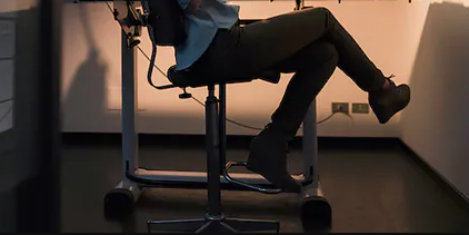To provide the best experiences, we use technologies like cookies to store and/or access device information. Consenting to these technologies will allow us to process data such as browsing behaviour or unique IDs on this site. Not consenting or withdrawing consent, may adversely affect certain features and functions.
The technical storage or access is strictly necessary for the legitimate purpose of enabling the use of a specific service explicitly requested by the subscriber or user, or for the sole purpose of carrying out the transmission of a communication over an electronic communications network.
The technical storage or access is necessary for the legitimate purpose of storing preferences that are not requested by the subscriber or user.
The technical storage or access that is used exclusively for statistical purposes.
The technical storage or access that is used exclusively for anonymous statistical purposes. Without a subpoena, voluntary compliance on the part of your Internet Service Provider, or additional records from a third party, information stored or retrieved for this purpose alone cannot usually be used to identify you.
The technical storage or access is required to create user profiles to send advertising, or to track the user on a website or across several websites for similar marketing purposes.
 There is a theory that when companies talk about issues such as corporate social responsibility they are doing so because it helps them to achieve their business goals. This is the coldly rational thing to do according to people like free market guru Milton Friedman who argues that companies should not actively pursue altruistic ends unless that pursuit is ultimately in the interest of their shareholders. As Friedman puts it: ‘Hypocrisy is virtuous when it serves the bottom line. Moral virtue is immoral when it does not’.
There is a theory that when companies talk about issues such as corporate social responsibility they are doing so because it helps them to achieve their business goals. This is the coldly rational thing to do according to people like free market guru Milton Friedman who argues that companies should not actively pursue altruistic ends unless that pursuit is ultimately in the interest of their shareholders. As Friedman puts it: ‘Hypocrisy is virtuous when it serves the bottom line. Moral virtue is immoral when it does not’.






 There is a disparity between the causes of communications anxiety between men and women, claims new research conducted by RADA in business. Male employees are 45 percent more likely than women to feel anxious when socialising with their work colleagues, while women are most scared of giving a presentation. Team building events were also found to be more challenging for men, with almost a fifth (19 percent) reporting feelings of communications anxiety. Work social events followed, with 17 percent reporting the same feelings. In contrast, the report found that female employees experience greater levels of anxiety when giving presentations in front of a group, to colleagues, or to management. The evidence suggests that while men require more help with skills around spontaneous communication, for women it is about standing their ground and getting their voice heard when stepping into the spotlight – often in situations that may have a significant impact on their career path. Notably, the research shows that women are also 39 percent more likely to experience workplace anxiety than men when in a job interview, and 37 percent more likely when negotiating a pay rise.
There is a disparity between the causes of communications anxiety between men and women, claims new research conducted by RADA in business. Male employees are 45 percent more likely than women to feel anxious when socialising with their work colleagues, while women are most scared of giving a presentation. Team building events were also found to be more challenging for men, with almost a fifth (19 percent) reporting feelings of communications anxiety. Work social events followed, with 17 percent reporting the same feelings. In contrast, the report found that female employees experience greater levels of anxiety when giving presentations in front of a group, to colleagues, or to management. The evidence suggests that while men require more help with skills around spontaneous communication, for women it is about standing their ground and getting their voice heard when stepping into the spotlight – often in situations that may have a significant impact on their career path. Notably, the research shows that women are also 39 percent more likely to experience workplace anxiety than men when in a job interview, and 37 percent more likely when negotiating a pay rise.





 One in three (34 percent) UK workers are dealing with anxiety, depression or stress, which is affecting their ability to carry out their day-to-day roles, claims a new report. Two in five (39 percent) have taken time off work or reduced their responsibilities because of their health, and of those, 39 percent did not feel comfortable telling their employer about the issue according to the PwC research. Nearly a quarter (23 percent) think their organisation does not take employee wellbeing seriously and more than half (54 percent) work for companies which do not offer health benefits such as counselling, health screening and subsidised gym memberships. The research suggests that Health and wellbeing has a significant impact on performance with four out of five workers (83 percent) believing that their wellbeing influences how productive they are. Pressures such as dealing with customers and clients, and long hours have the biggest impact on workplace wellbeing. The survey respondents also indicated a belief that technology can play a part in addressing health, with almost half saying they would be open to using an app to improve their wellbeing.
One in three (34 percent) UK workers are dealing with anxiety, depression or stress, which is affecting their ability to carry out their day-to-day roles, claims a new report. Two in five (39 percent) have taken time off work or reduced their responsibilities because of their health, and of those, 39 percent did not feel comfortable telling their employer about the issue according to the PwC research. Nearly a quarter (23 percent) think their organisation does not take employee wellbeing seriously and more than half (54 percent) work for companies which do not offer health benefits such as counselling, health screening and subsidised gym memberships. The research suggests that Health and wellbeing has a significant impact on performance with four out of five workers (83 percent) believing that their wellbeing influences how productive they are. Pressures such as dealing with customers and clients, and long hours have the biggest impact on workplace wellbeing. The survey respondents also indicated a belief that technology can play a part in addressing health, with almost half saying they would be open to using an app to improve their wellbeing.















June 22, 2015
Too much sitting down at work (or worrying about it) can increase anxiety
by Sara Bean • Comment, Flexible working, News, Wellbeing, Workplace
More →